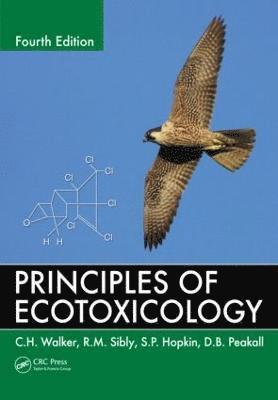
- Format
- Häftad (Paperback / softback)
- Språk
- Engelska
- Antal sidor
- 386
- Utgivningsdatum
- 2012-03-12
- Upplaga
- 4 ed
- Förlag
- CRC Press Inc
- Medarbetare
- Hopkin, Stephen P.
- Illustratör/Fotograf
- 36 black & white tables 151 black & white illustrations
- Illustrationer
- 36 Tables, black and white; 151 Illustrations, black and white
- Dimensioner
- 254 x 178 x 23 mm
- Vikt
- Antal komponenter
- 1
- Komponenter
- 66:B&W 7 x 10 in or 254 x 178 mm Perfect Bound on White w/Gloss Lam
- ISBN
- 9781439862667
- 681 g
Principles of Ecotoxicology
- Skickas från oss inom 2-5 vardagar.
- Fri frakt över 249 kr för privatkunder i Sverige.
Passar bra ihop
De som köpt den här boken har ofta också köpt The Anxious Generation av Jonathan Haidt (inbunden).
Köp båda 2 för 1158 krKundrecensioner
Fler böcker av författarna
-
Organic Pollutants
C H Walker
-
Biomarkers in Marine Organisms
Ph Garrigues, H Barth, C H Walker, Jean-Francois Narbonne
Recensioner i media
An excellent fresh edition to one of the best ecotoxicology textbooks. Authored by some of the best scientists in the field, it deserves a place on the bookshelf of any serious environmental scientist. Michael C. Newman, College of William & Mary Virginia Institute of Marine Science, USA Praise for Previous Editions Keeping the focus on principles over practice is what has made each incarnation of this book a bestseller. The third edition follows this central theme while bringing the text up to date and strengthening coverage in areas that have come to the forefront of the field. With updates to every chapter, the text provides essential information in an easy to use format. International Pest Control, Vol. 48 (2), March/April The book is quite extensive in content and length.the authors continue to assist us in understanding the integration of this new knowledge by focusing on the 'principles' of the science. Lee R. Shugart in Ecotoxicology, Vol. 16 (483), 2007 its aim is to provide a wide-ranging, concise and readable introduction to ecotoxicology that will encourages student to want to learn more about the fieldcontinues to succeed. David Spurgeon in The British Toxicology Society Newsletter, Winter 2006 The coauthorship is advantageous in that it ensures that all topics are addressed by an expert, but the style is consistent and the content is integrated in a way that texts assembled by editors cannot achieve. Glenn Suter in SETAC Globe, July-August 2001 To say that ecotoxicology is a multidisciplinary subject is an understatement. This text attempts a comprehensive survey of all of these aspects. It succeeds admirably. Dr. J.W. Daniel in Chemistry & Industry, March 5, 2001 The authors used their outstanding interdisciplinary experience to describe the progression from chemical analysis of environmental pollutants to their effects at the levels of the individual, population, community and, ultimately, ecosystem. Using appropriate examples and relevant case studies, they have made ecotoxicology more accessible to any person who is concerned with environmental changes induced by pollution. Dr. Laurent Lagadic in Ecotoxicology, Vol. 10 (6), 2001 This is, by any standards, an outstanding book, written by a chemist, a mathematician and a zoologist, who have achieved their aim in producing a truly interdisciplinary approach across the full spectrum of topics, from molecules to ecosystems.This book will certainly succeed in serving its primary purposeproviding a textbook for students, which covers the principles of ecotoxicology with a broad approach, cutting across traditional subject boundaries. Michael Balls in ATLA, 1996
Övrig information
C.H. Walker, R.M. Sibly, R.M. Sibly, D.B. Peakall
Innehållsförteckning
Introduction. Pollutants and Their Fate in Ecosystems: Major Classes of Pollutants. Routes by Which Pollutants Enter Ecosystems. Long-Range Movements and Global Transport of Pollutants. The Fate of Metals and Radioactive Isotopes in Contaminated Ecosystems. Fates of Organic Pollutants in Individuals and in Ecosystems. Effects of Pollutants on Individual Organisms: Testing for Ecotoxicity. Biochemical Effects of Pollutants. Physiological Effects of Pollutants. Interactive Effects of Pollutants. Biomarkers. In Situ Biological Monitoring. Effects of Pollutants on Populations and Communities: Changes in Numbers: Population Dynamics. Evolution of Resistance to Pollution. Changes in Communities and Ecosystems. Extrapolating from Molecular Interactions to Consequent Effects at Population Level. Biomarkers in Population Studies. Ecotoxicology: Looking to the Future. Glossary. Bibliography. Index.


